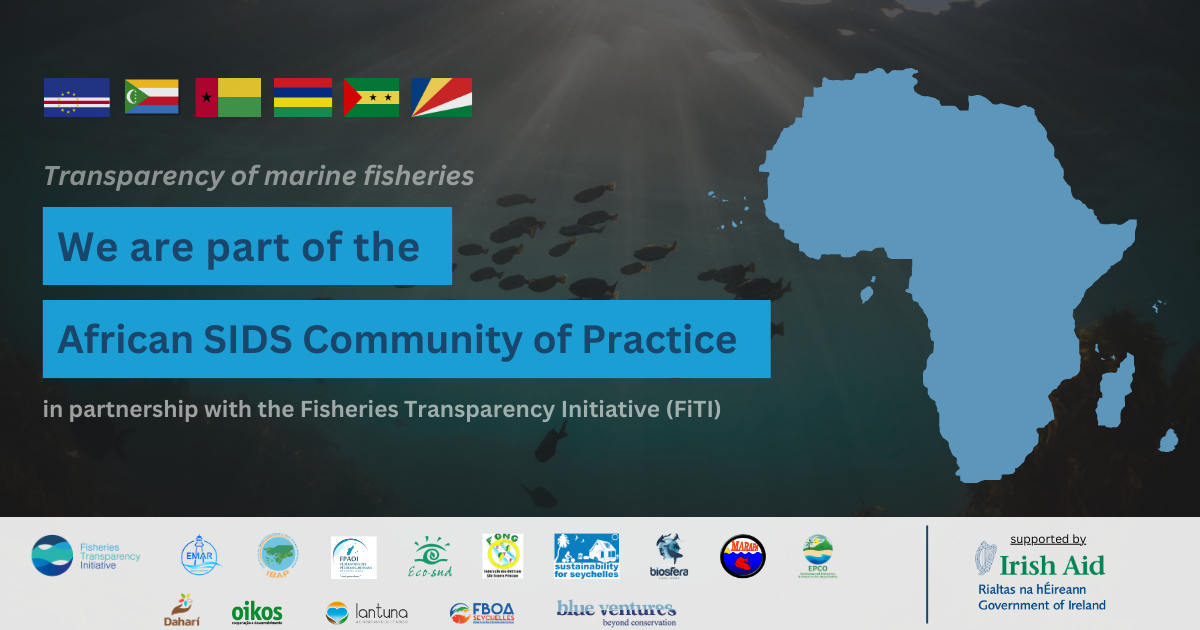Non-governmental actors in African SIDS join forces through FiTI’s Community of Practice

The FiTI has launched a new Community of Practice (CoP) to sensitise key non-governmental actors in all six African Small Island Developing States (SIDS) on the role of transparency in marine fisheries management. The CoP is financially supported by Irish Aid.
Transparency has a particularly elevated importance for fisheries management in SIDS due to their high levels of fisheries dependency, their ownership of vast areas of the ocean, as well as the growing international attention on blue growth. At the same time, SIDS face considerable barriers in the implementation of transparency policies and practices to support sustainable fisheries management, given their economic and environmental vulnerabilities, as well as political challenges around governance reforms, which are often caused by clientelism, weak media and civil society and gendered inequalities.
Yet, efforts to address a lack of government information on fisheries varies significantly between African SIDS. Seychelles is the only African SIDS that is regularly publishing fisheries information under the framework of the FiTI. Cabo Verde is in the process of publishing its first FiTI Report (expected by the end of 2023) and the government of São Tomé and Príncipe has publicly committed to implement the FiTI. The other three African SIDS – Comoros, Guinea-Bissau and Mauritius – have not made such commitments or implemented relevant practices.
This lack of transparency is a major underlying contributor to many problems in the fisheries sector – including illegal and unreported fishing, fleet overcapacity, legal overfishing, harmful subsidies, corruption, and (what may be perceived as) unjust fisheries management decisions.
As such, the FiTI’s ‘Transparency of Fisheries Management: Community of Practice among African Small Island Developing States (SIDS)’ brings together civil society organisations and small-scale fisheries associations from Cabo Verde, Comoros, Guinea-Bissau, Mauritius, São Tomé and Príncipe, and Seychelles with the aim of enabling participants to contribute to an environment that demands, understands and utilises government transparency in fisheries management.
Participating organisations include:
| Organisation | Country |
|---|---|
| Association of Fishermen and Fishmongers of Pedra Badejo | Cabo Verde |
| Association of Fishermen of São Pedro | Cabo Verde |
| Association of Fishermen of Salamansa | Cabo Verde |
| Biosfera | Cabo Verde |
| Escola do Mar (EMAR) | Cabo Verde |
| Lantuna | Cabo Verde |
| Association d’Intervention Pour le Developpement et l’Environnement (AIDE) | Comoros |
| Dahari | Comoros |
| Maison de la Société Civile Grande Comore | Comoros |
| Association of Fishermen and Fishmongers of GB | Guinea-Bissau |
| Instituto da Biodiversidade e das Áreas Protegidas (IBAP) | Guinea-Bissau |
| Organização para Defesa e Desenvolvimento das Zonas Húmidas (ODZH) | Guinea-Bissau |
| Eco-Sud | Mauritius |
| Fédération des Pêcheurs Artisans de l’Océan Indien (FPAOI) | Mauritius |
| Environmental Protection and Conservation Organisation (EPCO) | Mauritius |
| Association of Fishermen and Fishmongers of Neves | São Tomé and Príncipe |
| Federacao das ONGs em São Tomé and Príncipe | São Tomé and Príncipe |
| MARAPA | São Tomé and Príncipe |
| Oikos – Cooperação e Desenvolvimento | São Tomé and Príncipe |
| TLABA | São Tomé and Príncipe |
| Bel Ombre Fishermen’s Association | Seychelles |
| Seychelles Fishermen and Boatowners Association | Seychelles |
| Seychelles Islands Foundation | Seychelles |
| Sustainability for Seychelles | Seychelles |
Running until December 2023, the Community of Practice will see the FiTI International Secretariat guiding participants through a series of online trainings that focus on various aspects of transparency in fisheries management, including:
- The Fisheries Transparency Initiative (FiTI) and the FiTI Standard;
- Multi-stakeholder collaboration in marine fisheries;
- From public commitment to ‘Candidate Country’ to ‘Compliant Country’;
- Engagement and continuation strategies for countries; and
- Transparency and participatory governance.
It is expected that during the Community of Practice’s last meeting under this first term, members will decide whether they wish to extend the community for a second term or disband it.